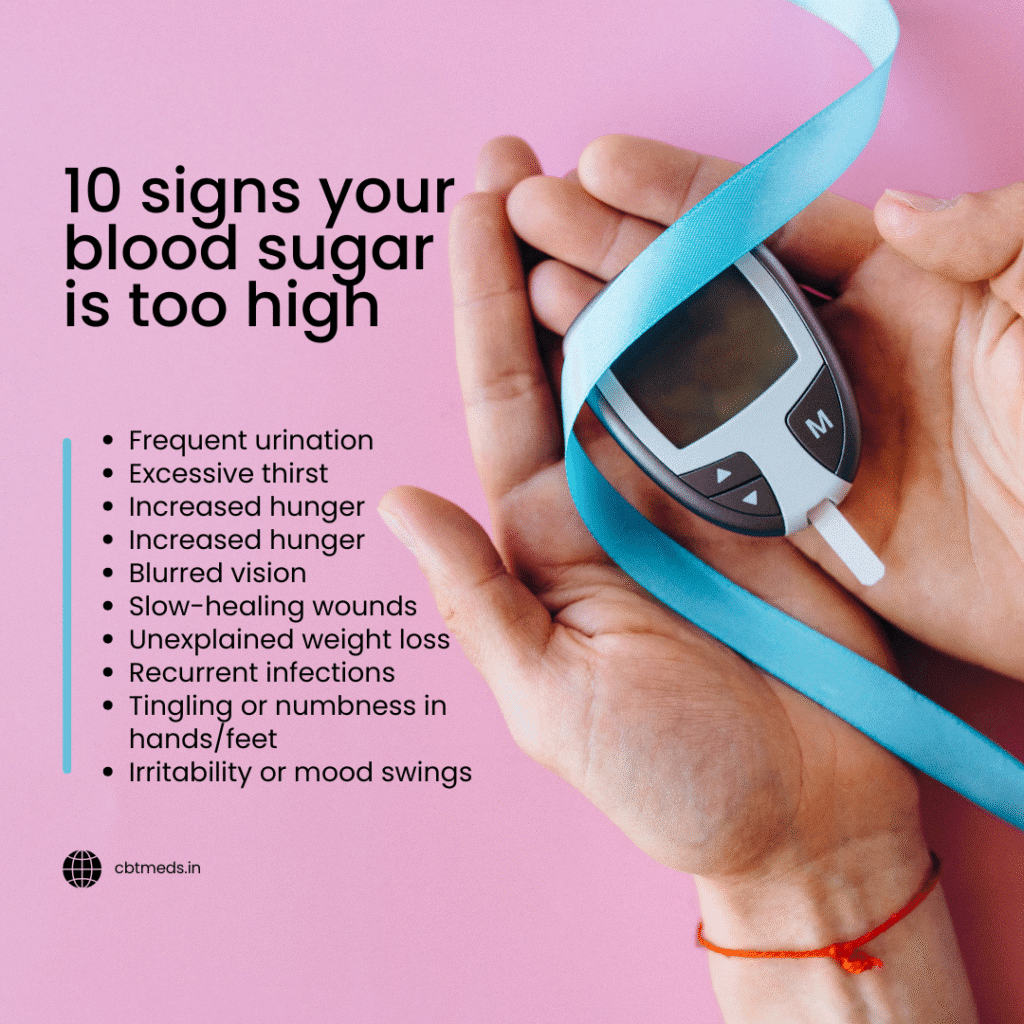
In today’s fast-paced lifestyle, it’s easy to overlook the subtle messages our body sends us. One such critical signal is elevated blood sugar levels, which, if ignored, can lead to type 2 diabetes, nerve damage, heart disease, and other serious complications.
High blood sugar (hyperglycaemia) doesn’t always come with loud alarms — it often begins with mild, persistent symptoms that slowly affect your health and well-being. By catching these early signs, you can take control and make the necessary lifestyle changes before it’s too late.
Here are the 10 key symptoms to watch out for:
1. Frequent Urination (Polyuria)
High glucose levels cause your kidneys to work overtime to remove the excess sugar through urine, leading to more bathroom trips — especially at night.
2. Excessive Thirst (Polydipsia)
Losing so much fluid through urination leaves you dehydrated, which makes you feel constantly thirsty.
3. Increased Hunger (Polyphagia)
Despite eating regularly, you may feel unusually hungry. This happens because your body isn’t efficiently using glucose for energy.
4. Blurred Vision
Fluctuating blood sugar can cause swelling in the eye’s lens, leading to blurry or distorted vision.
5. Slow-Healing Wounds
Elevated glucose impairs your body’s ability to heal properly, increasing the risk of infections and ulcers — especially in the feet and legs.
6. Unexplained Weight Loss
If your cells can’t absorb glucose, your body starts breaking down muscle and fat for energy — leading to sudden weight loss.
7. Recurrent Infections
High sugar levels weaken the immune system, making you more susceptible to frequent infections, particularly of the skin, gums, bladder, or vaginal area.
8. Tingling or Numbness in Hands/Feet
Nerve damage (diabetic neuropathy) can begin early, causing pins-and-needles sensations or numbness, especially in the extremities.
9. Irritability or Mood Swings
Unstable sugar levels can impact your mood, concentration, and mental clarity, often leading to anxiety or irritability.
10. Fatigue and Weakness
When your body can’t effectively use glucose for energy, you may feel constantly tired, even after proper rest.
🩺 Why These Signs Matter
These symptoms can appear gradually and may be easy to ignore. But when they occur together, they could signal prediabetes or diabetes in the making. Early intervention can:
- Prevent long-term complications
- Restore normal blood sugar with lifestyle changes
- Reduce the risk of heart disease, stroke, and kidney issues
✅ What You Should Do
If you identify with two or more of the above symptoms:
- Don’t panic — but do take action.
- Get your blood sugar tested — especially fasting glucose and HbA1c levels.
- Consult a healthcare provider — to determine your risk and get a tailored plan.
- Start lifestyle changes — such as cutting refined sugar, exercising regularly, and managing stress.
🔍 Final Thoughts
Your body whispers before it screams. Recognising these early warning signs of high blood sugar could help you prevent or delay the onset of serious health issues.
Don’t wait for a diagnosis — let awareness be your first step to better health.
💬 If you’re concerned about your blood sugar, consult a doctor or visit cbmeds.in for expert guidance.
#BloodSugar #Hyperglycemia #DiabetesAwareness #HealthTips #cbmeds #KnowTheSigns #BloodSugarControl #PreventDiabetes #HealthyLiving #EarlyDetectionSavesLives
